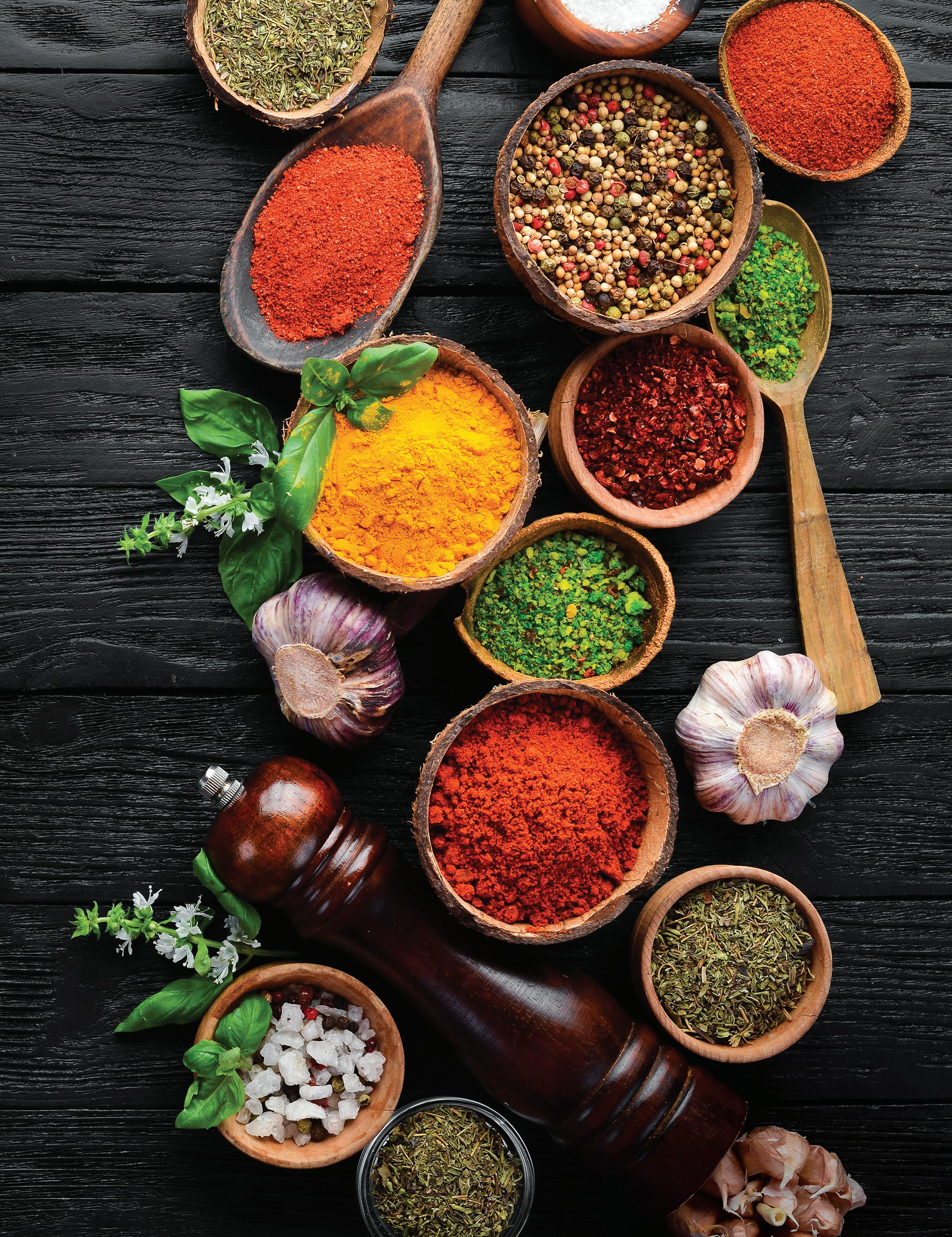
3 minute read
cook-at-home
season it!
spices and herbs pack a powerful punch
Advertisement
There’s no way to get flavor faster than with fresh or dried herbs and ground or whole spices. But these amazing foods aren’t just for perking up taste buds—many of them also have anti-inflammatory, antioxidant, and cancer-fighting abilities.
Allspice
Use this spice in sweet and savory recipes. A couple of whole allspice berries in a pot of stew or beans adds complexity. Allspice reduces inflammation in the body and can help prevent stomach ulcers.
Basil
Add chopped basil to balsamic vinegar and extra-virgin olive oil for a fresh-tasting salad dressing. Basil may reduce blood sugar spikes after eating it, as it slows glucose release into the bloodstream.
Cardamom
Popular in Indian cuisine, this spice has a sweet and woody flavor. Ground cardamom is easier to use than the whole pods. Cardamom can ease asthma symptoms by relaxing the lungs’ airways.
Cayenne
Add a pinch of cayenne to soups, sauces, hummus—anywhere you want a spicy punch. The capsaicin in cayenne raises the body’s core temperature and may even cause you to burn some extra calories.
Cinnamon
Sweet and spicy, cinnamon is a great substitute for sugar. Sprinkle it over oatmeal and yogurt. Cinnamon can lower blood pressure and reduce chronic inflammation. Don’t consume more than two teaspoons a day since most cinnamon contains coumarin—a liver-toxic compound.
Cloves
Cloves add an autumnal flavor to dishes. They are easiest to use ground, but whole cloves can be simmered in apple cider or in sweet and savory sauces (remove cloves before serving). Cloves kill bad bacteria and can help preserve bone density and strength.
Cumin
This spice is a great salt substitute. Add it to eggs, hummus, roasted nuts, and veggies. Studies on cumin show that it can help digest fatty meals and protect cellular DNA.
SOURCE Power Spicing by Rachel Beller, MS, RDN ($16.99, Clarkson Potter, 2019)
Garlic
After mincing or crushing the cloves, let the garlic sit for 10 minutes before it hits the pan— this allows time for the healthboosting compound allicin to develop. Add powdered garlic to broccoli to boost the veggie’s anticancer properties.
Ginger
Enjoy ginger when combined with sugar in desserts like gingerbread; you can try it in savory dishes too. Ginger helps with digestion and nausea. It also helps increase the liver’s detoxifying enzymes.
Oregano
Mexican oregano is stronger and more robust. The Mediterranean variety is milder and sweeter. Oregano lowers LDL (bad) cholesterol and can reduce the risk of heart disease.
Turmeric
Sprinkle ground turmeric over avocado toast, fish, and veggies. Whisk it into salad dressings. Studies show its potential ability to combat diabetes, prevent cancer cell growth, and protect the brain from Alzheimer’s disease.
Spice-Infused Rice
From Masala: Recipes from India, the Land of Spices by Anita Jaisinghani ($35, Ten Speed Press, 2022) 1 c white basmati rice 2 Tbsp light sesame oil, olive oil, coconut oil, or ghee Whole spices (such as a cinnamon stick, cloves, green or black cardamom pods, and/or star anise) 1 tsp sea salt
1. Rinse rice under water two or three times. After the last rinse, soak rice in twice the amount of water for at least 30 minutes or up to 2 hours. Drain. 2. In a medium saucepan, combine drained rice with 2 cups water, the oil, whole spices, and salt. Bring to a boil over high heat. Lower heat to low, cover, and simmer for 7 to 8 minutes, until water has been absorbed completely. Turn heat off and let rice rest for 10 to 12 minutes. Stir gently with a fork before serving.
Per serving: 230 Calories, 3 g Protein, 37 g Carbohydrates, 0 g Total sugars (0 g Added sugars), 1 g Fiber, 7 g Total fat (1 g sat), 124 mg Sodium, ★★★★ Folate, ★★ Vitamin B1 (thiamine) prep time serves 4











